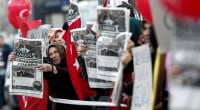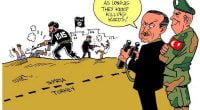Can a Post-Coup Turkey Get Along with Europe?

Date posted: September 16, 2016
Ivan Krastev
SOFIA, Bulgaria — As I was boarding a Turkish Airlines flight to Ankara some days ago, a flight attendant handed me a slickly produced brochure telling the story of the failed coup attempt of July 15. It praised the Turkish people and their spirited defense of democracy, and it blamed the Gulen movement that allegedly organized the coup, portraying it as the sort of dark religious conspiracy that you’d expect to find in a Dan Brown novel.
The patriotic brochure foreshadowed much of what I was to hear from government ministers, independent journalists and opposition leaders during my visit in the country. These very different individuals, often coming from opposite political camps, were in lock step on one thing: The July 15 coup attempt was completely unexpected (in a country that had endured four coups in recent decades), and for that reason deeply traumatic. And to a person, they blamed the Gulenists.
That sense of surprise helps to explain how an ill-managed coup that seemed to end as soon as it began could nevertheless send shock waves through the country. For a brief frightening moment, Turks confronted the possibility of being drawn into a bloody civil war. What’s more, the West responded with a combination of halfhearted condemnation of the coup plotters and a wait-and-see realpolitik.
The government’s fury is understandable, as is the need to rid the state of putschists. But it should distinguish between those who took part in the coup and those who simply belonged to the Gulen movement. Take, for example, the Bank Asya case. In 2014, the government put pressure on the bank, which was owned by businesspeople close to the Gulenists. In an attempt to save the bank, Mr. Gulen asked his followers to deposit their money in the bank, and also to borrow from other banks and invest that money in the movement’s bank. Many Gulenists followed the script. Now the government is trying to identify those individuals who followed Mr. Gulen’s request and brand them enemies of the state; in July it canceled the bank’s license.
But while Turks have reason to be angry with the Western reaction, Ankara’s official narrative suffers from its own tendentious blinders. It has blamed the malicious influence of the religious leader Fethullah Gulen, although support for the coup was much broader. To hear the ruling Justice and Development Party tell it, the Gulenists are to blame for the government’s crackdown on protesters in Gezi Park in Istanbul in 2013 and the shooting down of a Russian plane on the Turkish-Syrian border last fall. Some even accuse them of masterminding Turkey’s resistance to a joint American-Turkey military operation against the Islamic State in Syria.
Nor has the government bothered to explain why, even as it began its split with the Gulenists, it ignored warnings by journalists and opposition leaders that the movement was infiltrating state institutions, taking control over large sections of the judicial system and fabricating false evidence in order to discredit and imprison its enemies.
None of this has stopped the government from undertaking a huge, self-destructive purge, with around 10,000 people arrested, 100,000 people dismissed, and the seizure of assets of more than $4 billion, numbers that worry not just human rights activists but foreign investors as well.
The government’s fury is understandable, as is the need to rid the state of putschists. But it should distinguish between those who took part in the coup and those who simply belonged to the Gulen movement.
Take, for example, the Bank Asya case. In 2014, the government put pressure on the bank, which was owned by businesspeople close to the Gulenists. In an attempt to save the bank, Mr. Gulen asked his followers to deposit their money in the bank, and also to borrow from other banks and invest that money in the movement’s bank. Many Gulenists followed the script. Now the government is trying to identify those individuals who followed Mr. Gulen’s request and brand them enemies of the state; in July it canceled the bank’s license.
As I saw during my trip, the government’s inability — or refusal — to draw such distinctions has already had a profound impact on Turkish civil society. In a normal democracy, courts would be able to adjudicate these questions. But because Gulenists dominated the judicial system at many levels, and because they have all been purged, the new and remaining judges lack the legitimacy and, in my view, the will to confront the government. The same is true for the media: In a poisoned atmosphere where any criticism of the purges is read as a defense of the Gulenists, few journalists are ready to speak out.
At the same time, the failure of European leaders to respond forcefully to the coup, and their lack of solidarity with Turkey, means that the European Union has lost moral credibility within the country, at the very moment when such a voice is needed the most. In a country that was already souring on the idea of joining the European Union, the coup and its consequences seem to have cut off any such hopes for good.
Of course, membership or not, Turkey must continue working with the European Union, and vice versa — on refugees, on terror, on larger questions of regional peace and stability. Figuring out how to do that won’t be easy. But a few steps seem obviously necessary.
Europe should cease its bogus claim that Turkey has sheltered almost three million refugees (feeding them and trying to give education to the children) with the sole purpose of using them against Europe. Similarly, Turks must stop pretending that any criticism coming from Europe is a sign of Europe’s antipathy to Islam or a pro-Gulen bias.
In the last years, European-Turkish relations have been drowning in a poisonous mix of shared interests, shared frustration and rank hypocrisy. Let’s hope that shared interest will prevail over shared frustrations, and that rank hypocrisy will not be replaced by naked resentment.
Source: New York Times , September 16, 2016
Tags: Europe | European Union | Military coups in Turkey | Turkey |
























